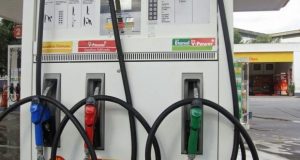The Chamber of Petroleum Consumers (COPEC) insists the government must consider a policy to scrap some taxes off petroleum products, despite the President’s decision not to.
President Akufo-Addo speaking during this year’s May Day parade on Sunday dismissed calls on the government to reduce taxes on petroleum products, describing it as an unsustainable move to make.
According to him, the government risks losing about GH¢4 billion if it makes any such move.
Duncan Amoah, reacting to this development, believes the government rather stands to lose should the cost of fuel continue to rise.
“The response that the President gave is one that needs further scrutiny and assessment. It cannot be the case that fuel prices will only affect the people. Fuel prices also affect the government and the state itself. Any time petrol prices go up, the state will spend more that accounting year because the state does not run an OMC and is also buying from the same market that the people buy from.”
“So when petrol prices increase, the security agencies that the government will need to provide fuel for, the government machinery, ministries, departments, agencies across the country, their expenditure line will shoot up. So the bottom line is government in itself will suffer collateral consequence at the end of the accounting year,” he explained.
Ghana imposes seven levies and five margins on petroleum products. The levies are energy debt recovery levy of 49 pesewas, energy fund levy of 1 pesewa, energy sector recovery levy of 20 pesewas, price stabilization and recovery levy of 14 pesewas, road fund levy of 48 pesewas, sanitation and pollution levy of 10 pesewas, and special petroleum tax levy of 46 pesewas which all make up a sum of GHS2.
The margins paid to the distributors are 9 pesewas for bulk oil storage and transportation, 30 pesewas dealers (retailers/operators), 5 pesewas for fuel marking, 46 pesewas for marketers, and 11 pesewas for primary distribution.
The 49 pesewa Energy Debt recovery Levy was introduced to accumulate funds to help clear the mounting debt that had the capacity to collapse the entire sector. Years after, the levy is still charged but many lament the lack of accountability associated with the collection and utilization of the levy.
The 20 pesewa Energy Sector Recovery Levy was introduced to pay energy sector bills. After a period of collection however, the proceeds have been collateralized under the ESLA PLC; a Special Purpose Vehicle incorporated as a public limited liability company to issue long-term bonds to resolve energy sector debts due to banks and trade creditors.
The 14 pesewa Price Stabilsation and recovery levy serves as a buffer to cushion petroleum consumers when there are external shocks to the pricing regime for fuel. Last year, the NPA suspended this levy for a period to cushion consumers in the face of global price hikes.
The 48 pesewa road fund levy supports the construction of roads and other activities in the sector, whiles the 10 pesewa Sanitation and Pollution Levy is accumulated to deal with the challenges of waste disposal and the provision of modern landfill sites, among others.
Analysts like the Executive Secretary of the Chamber of Petroleum Consumers, Duncan Amoah have criticized the imposition of some of the taxes on petroleum products, arguing that they ultimately are regressive and unduly burden the poor.
Some of the taxes and levies he insists should be reviewed are the PSRL; Special Petroleum Tax; Primary Distribution Margin; Energy Debt Recovery levy and the BOST Margin.
But these taxes imposed by the government on fuel prices are a major source of revenue and it is not ready to let them go any time soon.
In making a little compromise, the government suspended the PSRL charge on petrol, diesel and LPG from November 2021 to the end of January 2022.
Also in March this year, a 15 pesewa reduction was announced after government tinkered with the price margins on fuel.
Despite these interventions, the cost of fuel at the pumps still remains high.







